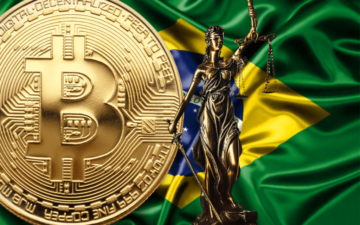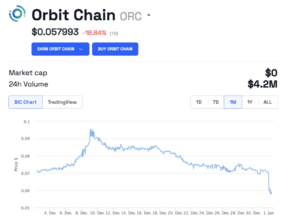
- As the crypto industry grows and matures, creating a legal framework that can balance innovation with consumer protection and financial stability is necessary.
- The challenges regulators face include determining how to classify cryptocurrencies under existing legal frameworks, ensuring Anti-Money Laundering AML and Know-Your-Customer KYC compliance, and addressing concerns over investor protection and market stability.
- It is important for stakeholders, including regulators, industry participants, and investors, to work together to shape the regulatory landscape.
Cryptocurrencies and blockchain technology have emerged as a major disruptor in the global financial system. The decentralized and distributed nature of these technologies has the potential to revolutionize traditional financial systems, but they also pose unique challenges in terms of regulation. As the crypto industry grows and matures, creating a legal framework that can balance innovation with consumer protection and financial stability is necessary.
Crypto Regulation: The Current State of Affairs
The regulatory landscape for cryptocurrencies and blockchain technology varies widely around the world. Some countries have taken a proactive approach to regulating the crypto industry, while others have banned cryptocurrencies altogether. The challenges regulators face include determining how to classify cryptocurrencies under existing legal frameworks, ensuring Anti-Money Laundering AML and Know-Your-Customer KYC compliance, and addressing concerns over investor protection and market stability.
In the United States, the regulatory environment for cryptocurrencies has been in a state of flux. The Securities and Exchange Commission (SEC) has been grappling with classifying cryptocurrencies and tokens under securities laws, while the Commodity Futures Trading Commission (CFTC) has taken a more permissive approach. Similarly, the Internal Revenue Service (IRS) has struggled to determine how to tax cryptocurrencies, leading to confusion and uncertainty for investors.
In Europe, countries such as Malta and Estonia have been at the forefront of embracing cryptocurrencies and blockchain technology. Malta has established itself as a hub for crypto exchanges and has passed several pieces of legislation to provide clarity and regulatory certainty for the industry. Estonia has also been proactive in promoting the adoption of blockchain technology and has launched several initiatives to encourage innovation in the sector.
China has taken a hardline approach to cryptocurrencies in Asia, banning ICOs and cryptocurrency exchanges. On the other hand, Japan has embraced cryptocurrencies and passed a law regulating cryptocurrency exchanges. South Korea has also taken steps to regulate cryptocurrencies, although it has been more cautious in its approach.
In Africa, the reception has been mixed. North African countries moved to ban cryptocurrency after Morrocco kicked off the trend. The majority of African countries placed a ban on cryptocurrency trading. Most are implicit bans, while some countries have gone to the extreme and outright banned it. However, it’s not all bad news. The Central African Republic became the first to accept Bitcoin as legal tender. Africa de Sud a reglementat criptomonedele în temeiul legii sale privind activele financiare. This also covers crypto asset service providers such as exchanges and wallets. Namibia lifted its crypto ban allowing willing parties to settle transactions in cryptocurrency. Kenya moved to bring cryptocurrency into the fold by taxing cryptocurrency gains. Nigeria launched Africa’s first Central Bank Digital Currency (CBDC).
Challenges in Crypto Regulation
Reglementarea criptomonedelor poate fi o provocare din mai multe motive:
Descentralizare
Criptomonedele operează pe rețele descentralizate, cum ar fi tehnologia blockchain. Aceasta înseamnă că nu există nicio autoritate centrală sau organism de conducere care să controleze sau să supravegheze tranzacțiile cu criptomonede. Această natură descentralizată face dificilă aplicarea eficientă a cadrelor de reglementare tradiționale.
Lipsa de jurisdicție
Criptomonedele nu sunt legate de granițele geografice, ceea ce face dificil pentru orice guvern sau organism de reglementare să aplice reglementările la nivel universal. Tranzacțiile cu criptomonede pot avea loc în mai multe țări și adesea nu este clar care jurisdicție ar trebui să își asume responsabilitatea pentru reglementare.
Anonim și pseudonim
Criptomonedele oferă utilizatorilor un anumit nivel de confidențialitate și anonimat. Deși această caracteristică este adesea văzută ca fiind benefică, ea pune, de asemenea, provocări pentru autoritățile de reglementare, deoarece poate facilita activități ilicite, cum ar fi spălarea banilor, evaziunea fiscală și finanțarea activităților ilegale. Echilibrarea confidențialității cu nevoia de reglementare este o sarcină complexă.
Tehnologie care evoluează rapid
Industria cripto evoluează în mod constant, cu noi criptomonede, jetoane și tehnologii care apar în mod regulat. Autoritățile de reglementare se luptă adesea să țină pasul cu aceste evoluții și să înțeleagă complexitățile fiecărei criptomonede, tehnologia de bază și potențialele sale implicații pentru piețele financiare și protecția consumatorilor.
Coordonare globală
Deoarece criptomonedele nu se limitează la o singură jurisdicție, o reglementare eficientă necesită cooperare internațională și coordonare între țări. Atingerea consensului asupra standardelor de reglementare și a mecanismelor de aplicare poate fi o provocare din cauza abordărilor și priorităților de reglementare diferite de la diferite națiuni.
Echilibrarea inovației și protecția investitorilor
Autoritățile de reglementare trebuie să echilibreze promovarea inovației în criptomonede și protejarea investitorilor de potențiale riscuri. Reglementările prea stricte pot înăbuși inovația, în timp ce reglementările laxe expun investitorii la escrocherii, la manipularea pieței și la pierderi financiare.
Opportunities in Crypto Regulation
Despite the challenges, several opportunities exist in regulating cryptocurrencies and blockchain technology. Regulations can provide market participants clarity and certainty, leading to increased adoption and investment. Moreover, regulations can provide a framework for innovation in the industry, which can drive economic growth and job creation.
Regulations can also protect investors and consumers from fraudulent activities in the industry. The lack of transparency and oversight in some areas of the crypto industry has led to fraud and scams. Regulations can protect investors and consumers, increasing industry trust and promoting long-term sustainability.
Furthermore, regulations can enhance transparency and accountability in the industry. Regulations can increase trust and confidence in the industry by requiring greater transparency in transactions and providing oversight for exchanges and other market participants. This can lead to greater adoption and investment and increased legitimacy for cryptocurrencies and blockchain technology.
There is also something to say about the prospects of regulating cryptocurrency for African governments. It has become a popular campaigning point for presidential candidates to mention taxing crypto as part of the digital economy. Regulating crypto also creates the opportunity to tax it appropriately. The potential benefits of such a move are astronomical. Revenue realised from taxing cryptocurrency and other digital activity could be well used to develop infrastructure further.
Crypto regulation the way forward
În concluzie, crearea unui cadru legal pentru criptomonede și tehnologia blockchain prezintă provocări și oportunități. În timp ce natura unică a acestor tehnologii ridică provocări de reglementare, există și oportunități pentru inovare, creștere și protecția consumatorilor. Dezvoltarea unui cadru de reglementare care echilibrează aceste interese concurente va fi crucială pentru sustenabilitatea și succesul pe termen lung al industriei.
Este important ca părțile interesate, inclusiv autoritățile de reglementare, participanții din industrie și investitorii, să lucreze împreună pentru a modela peisajul de reglementare. Colaborarea poate ajuta la asigurarea faptului că reglementările sunt eficiente, eficiente și adecvate pentru caracteristicile unice ale industriei.
Viitorul reglementării criptografice este probabil să aibă un impact semnificativ asupra economiei globale. Pe măsură ce criptomonedele și tehnologia blockchain continuă să câștige teren, autoritățile de reglementare se vor confrunta cu o presiune din ce în ce mai mare pentru a oferi claritate și îndrumări participanților pe piață. Luând o abordare proactivă și lucrând în colaborare, autoritățile de reglementare pot contribui la asigurarea faptului că industria continuă să crească și să inoveze, oferind în același timp protecție consumatorilor și stabilitate financiară.
- Distribuție de conținut bazat pe SEO și PR. Amplifică-te astăzi.
- PlatoAiStream. Web3 Data Intelligence. Cunoștințe amplificate. Accesați Aici.
- Mintând viitorul cu Adryenn Ashley. Accesați Aici.
- Cumpărați și vindeți acțiuni în companii PRE-IPO cu PREIPO®. Accesați Aici.
- Sursa: https://web3africa.news/2023/05/20/news/the-increasing-need-for-crypto-regulation/
- :are
- :este
- :nu
- a
- Despre Noi
- Accept
- responsabilitate
- realizarea
- peste
- activităţi de
- activitate
- adresare
- Adoptare
- Africa
- african
- După
- TOATE
- Permiterea
- de asemenea
- Cu toate ca
- întru totul
- CSB
- printre
- și
- anonimat
- împotriva spălării de bani
- Orice
- Aplică
- abordare
- abordari
- adecvat
- în mod corespunzător
- SUNT
- domenii
- în jurul
- AS
- Asia
- activ
- Bunuri
- At
- autoritate
- Rău
- Sold
- soldurile
- Interzice
- Bancă
- interzis
- banurile
- BE
- a devenit
- deveni
- fost
- benefică
- Beneficiile
- Bitcoin
- blockchain
- Tehnologia blocurilor
- corp
- Legat
- limitele
- aduce
- dar
- by
- agitație
- CAN
- candidaţilor
- precaut
- CBDCA
- central
- Republica Centrafricană
- autoritatea centrală
- Banca centrala
- moneda digitală a băncii centrale
- moneda digitala a bancii centrale (CBDC)
- sigur
- certitudine
- CFTC
- provocări
- provocare
- Caracteristici
- claritate
- Clasifica
- colaborare
- comision
- produs
- concurente
- complex
- conformitate
- preocupările
- concluzie
- încredere
- confuzie
- Consens
- mereu
- consumator
- Protectia Consumatorului
- Consumatorii
- continua
- continuă
- controale
- cooperare
- coordonare
- ar putea
- țări
- Covers
- creează
- Crearea
- creaţie
- crucial
- cripto
- activ cripto
- interdicție crypto
- Schimburi Crypto
- Industria criptelor
- Crypto regulation
- cryptocurrencies
- cryptocurrency
- Schimburi de criptocurrency
- criptarea tranzacțiilor
- Monedă
- Curent
- Starea curenta
- descentralizată
- rețele descentralizate
- Determina
- determinarea
- dezvolta
- în curs de dezvoltare
- evoluții
- diferit
- dificil
- digital
- monedă digitală
- Economia digitală
- distribuite
- conduce
- două
- fiecare
- Economic
- Crestere economica
- economie
- Eficace
- în mod eficient
- eficient
- îmbrățișat
- îmbrățișare
- a apărut
- șmirghel
- încuraja
- aplica
- executare
- spori
- asigura
- asigurare
- Mediu inconjurator
- stabilit
- Estonia
- Europa
- evoluează
- evoluție
- schimb
- Platforme de tranzacţionare
- exista
- existent
- extremă
- Față
- facilita
- Caracteristică
- financiar
- stabilitate Financiară
- sistem financiar
- sistemele financiare
- finanțare
- First
- FLUX
- Pentru
- pentru investitori
- frunte
- promovarea
- Cadru
- cadre
- fraudă
- necinstit
- din
- mai mult
- viitor
- Futures
- Tranzacționare futures
- Câştig
- câștig
- geografice
- Caritate
- Economia globala
- financiar global
- sistemul financiar global
- guvernare
- Guvern
- guvernele
- mai mare
- Crește
- creste
- Creștere
- îndrumare
- mână
- Avea
- ajutor
- Cum
- Cum Pentru a
- Totuși
- HTTPS
- Butuc
- Icos
- Ilegal
- ilicit
- Impactul
- implicații
- important
- in
- include
- Inclusiv
- Crește
- a crescut
- crescând
- industrie
- industria
- Infrastructură
- inițiative
- inova
- Inovaţie
- interese
- intern
- Serviciul de Internal Revenue
- Internațional
- în
- complexități
- investiţie
- Investopedia
- investitor
- protecția investitorilor
- Investitori
- IRS
- IT
- ESTE
- în sine
- Japonia
- Loc de munca
- jpg
- competență
- A pastra
- Kenia
- Coreea
- KYC
- Conformitate KYC
- lipsă
- peisaj
- a lansat
- Spălarea
- Drept
- legii
- conduce
- conducere
- Led
- Legal
- Cadrul legal
- MIJLOC LEGAL DE PLATĂ
- Legislație
- legitimitate
- Nivel
- Ridicat
- Probabil
- pe termen lung
- pierderi
- major
- Majoritate
- FACE
- Efectuarea
- Malta
- Manipulare
- Piață
- de manipulare a pieței
- pieţe
- matur
- mijloace
- mecanisme
- mixt
- bani
- Spălare de bani
- mai mult
- În plus
- cele mai multe
- muta
- multiplu
- trebuie sa
- Națiuni
- Natură
- necesar
- Nevoie
- rețele
- Nou
- ştiri
- Nigeria
- Nu.
- North
- of
- de pe
- de multe ori
- on
- funcionar
- Oportunităţi
- Oportunitate
- or
- Altele
- Altele
- peste
- Supraveghere
- Pace
- parte
- participanţi
- petreceri
- Trecut
- piese
- Plato
- Informații despre date Platon
- PlatoData
- Punct
- Popular
- ridică
- potenţial
- cadouri
- prezidenţial
- presiune
- intimitate
- Proactivă
- Promovarea
- perspective
- proteja
- protejează investitorii
- protectoare
- protecţie
- furniza
- furnizori
- furnizarea
- motive
- recepție
- regulat
- Reglementa
- reglementate
- Regulament
- regulament
- Autoritățile de reglementare
- autoritățile de reglementare
- peisajul de reglementare
- Republică
- Necesită
- responsabilitate
- venituri
- revoluţiona
- Riscurile
- Spune
- escrocherii
- SEC
- sector
- Titluri de valoare
- Securities and Exchange Commission
- Legile valorilor mobiliare
- văzut
- serviciu
- prestatori de servicii
- rezolva
- câteva
- Modela
- să
- semnificativ
- asemănător
- singur
- unele
- ceva
- Sud
- Coreea de Sud
- Stabilitate
- părțile interesate
- standarde
- Stat
- Statele
- paşi
- Lupta
- succes
- astfel de
- Durabilitate
- sistem
- sisteme
- Lua
- luate
- luare
- Sarcină
- impozit
- Evaziune fiscala
- Tehnologii
- Tehnologia
- Ofertă
- termeni
- acea
- lumea
- Acolo.
- Acestea
- ei
- acest
- la
- împreună
- indicativele
- tracțiune
- Trading
- tradiţional
- Tranzacții
- Transparență
- tendință
- Încredere
- Incertitudine
- în
- care stau la baza
- înţelege
- unic
- Unit
- Statele Unite
- utilizat
- utilizatorii
- Portofele
- Cale..
- BINE
- care
- în timp ce
- pe larg
- voi
- dispus
- cu
- Apartamente
- lucram impreuna
- de lucru
- lume
- zephyrnet












